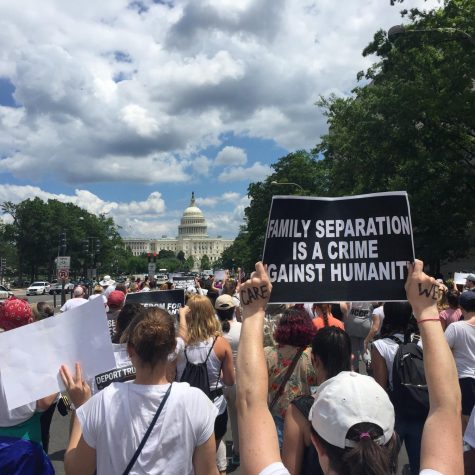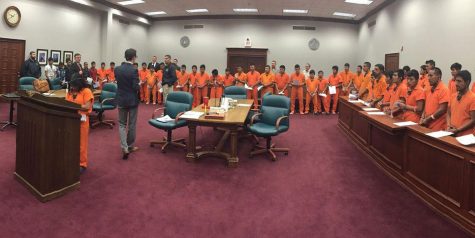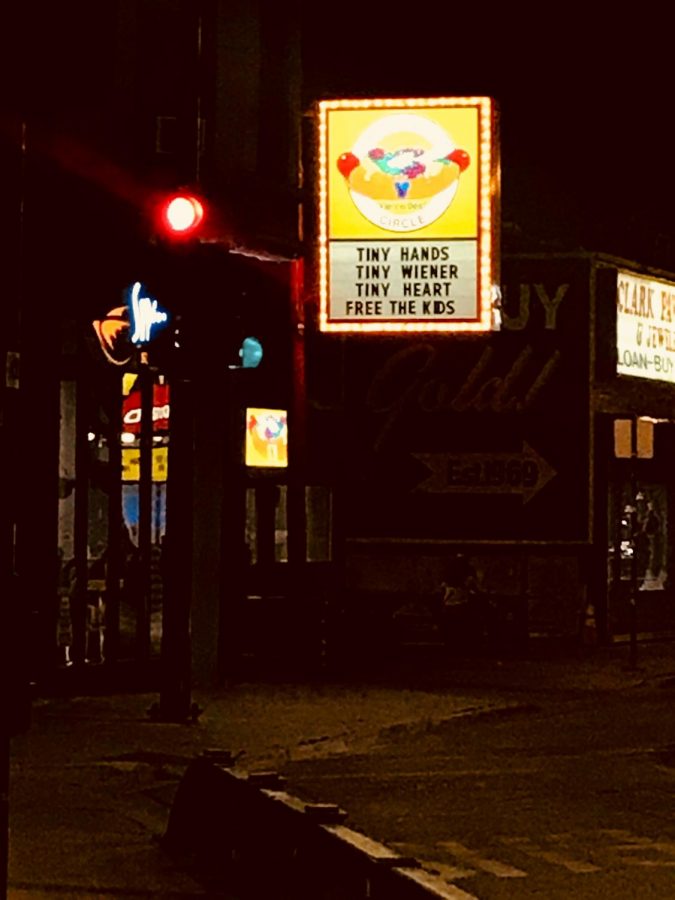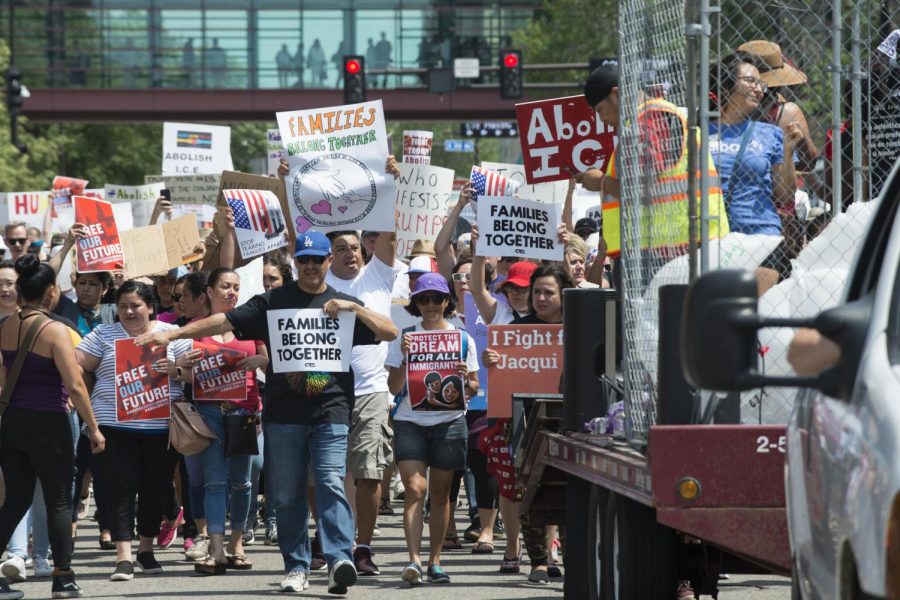Part I of II: DuPage World Relief’s mission to aid refugees (Discussing President Trump’s “zero-tolerance immigration policy”)
Protesters march through the streets of Minneapolis, MN, demanding President Trump end his “zero-tolerance immigration policy.” Before Trump eventually reversed his policy, capitulating to political pressure and nationwide-public outrage, over 2,500 immigrant children were separated from their families following Attorney General Jeff Sessions’ policy announcement on April 6. Trump’s policies have also made it harder for refugees to claim asylum once they cross the southern border.
August 17, 2018
In times of darkness we turn to figures of light.
As I see hysterical children being taken away from their parents, desperate people fleeing violence and persecution only to be deported back to their tragic fates; I let the words of an old luminary course through me.
“Each time a man stands up for an ideal, or acts to improve the lot of others, or strikes out against injustice, he sends forth a tiny ripple of hope. And crossing each other from a million different centers of energy and daring, those ripples build a current which can sweep down the mightiest walls of oppression and resistance.” – Robert F. Kennedy, Apartheid South Africa, 1966.

This affirmation of hope resonates every time a voice is raised against bigotry. It resounds when protesters reject unjust laws built around intolerance for the most desperate among us.
World Relief and other immigration nonprofits provide a lens to help filter out the darkness.
Fear has the power to corrode the strongest of our morals. It debases us into seeking the security promised by a manipulative demagogue. When the innocent and unfortunate peripheries of society are labeled drug traffickers, rapists, criminals and MS-13 thugs, we are compelled to ignore the acknowledgment of their humanity. For the sake of denigration, we turn a blind-eye and let the injustices proliferate.
World Relief DuPage/Aurora Communication Coordinator Tabitha McDuffee sees the inherent hypocrisy in following such xenophobic pontifications.

“The people who are seeking asylum are fleeing the exact type of horrific violence that President (Donald) Trump describes when talking about MS-13. People who are coming from Central America are often fleeing because they have seen a family member violently murdered, raped or they themselves have faced violence or threats,” said McDuffee.
World Relief is an international relief and development agency focused on helping victims of poverty, disease, hunger, war, disasters and persecution. In an official statement, they announce their intentions to, “work holistically with the local church to stand for the sick, the widow, the orphan, the alien, the displaced, the devastated, the marginalized, and the disenfranchised.”
In the U.S., World Relief is contracted by the U.S. State Department to resettle accepted refugees. In a statement, World Relief DuPage/Aurora explains, “We offer services designed to promote local integration so that refugees and immigrants root and flourish in supportive communities.”
World Relief has created a Family Reunification Fund, raising proceeds to help children separated from their families under the Trump administration’s “zero-tolerance” policy. The policy was crafted to intimidate and deter people from crossing the border illegally.
McDuffee explained why the policy has been so controversial, “When Attorney General Jeff Sessions announced the policy in March, the result has been every person who crossed the border illegally is now prosecuted in criminal court. We have immigration court and criminal court, which are two separate tracts that do not interact. Criminal court is under the Department of Justice, and the other is not. In the past there has been discretion in law enforcement. The implementation of the zero-tolerance policy eliminated this discretion.
“World relief stands against this policy because the repercussions have resulted in children being separated from their families. However, even if we set that aside, we believe that laws that do not leave any discretion, cannot be truly just laws. Especially in the case of people who have crossed the border illegally. People who turn themselves in to Border Patrol to claim asylum are people who are afraid for their lives and horrified at returning back to their countries of origin,” she said.

According to the Department of Homeland Security, from May 5-June 9, 2,342 minors were separated from 2,206 parents. Under the Obama administration, families were referred for civil deportation proceedings. Under Trump’s policy, the adults are held in custody of the U.S. Marshals Service to face criminal prosecution. Due to the 1997 court ruling, Flores v. Reno, children cannot be detained with their parents for more than 20 days. So, the children have been moved to facilities run by the Department of Health and Human Services.
For the first three days, the children are held in Customs and Border Protection “chain-link cage” facilities widely criticized in the media. If a relative or foster is not available, the children are then moved to Office of Refugee Resettlement (part of Health and Human Services) detention centers, tent camps or “tender-age shelters.” Most parents are unaware of where their children have been moved. Some parents have even been deported and now face having to track down their separated children from their countries of origin.
McDuffee explained how the Family Reunification Fund raises money to provide legal services, and also helps parents track down their children and get them back.
With political acrimony fuelling tensions on each respective partisan side, the fate of those crossing the border can be as fragile and arbitrary as who holds the power to establish their label. The public’s perception of those affected, permits the policy to be accepted as necessary, or rejected as morally outrageous.
To dehumanize the immigrants under one negative stereotype, Trump has tweeted, “MS-13 gang members are being removed by our Great ICE and Border Patrol Agents by the thousands, but these killers come back in from El Salvador, and through Mexico, like water. El Salvador just takes our money, and Mexico must help MORE with this problem. We need The Wall.”
He has further tried to manipulate the narrative by tweeting, “We must maintain a strong Southern Border. We cannot allow our Country to be overrun by illegal immigrants as the Democrats tell their phony stories of sadness and grief, hoping it will help them in the elections.”
Whether through political spin or personal arrogance, those crossing the border illegally have fallen under a plethora of labels.
McDuffee clarified the distinction, “Anytime World Relief is using the distinguishing terms immigrant or refugee, we are using the international legal definition for refugee. According to the U.N. Refugee Convention of 1951, a refugee is anyone who has a well-founded fear of persecution in their home country and has been forced to leave that country. This comes under the distinctions of five categories: are they in the danger on the basis of race, religion, nationality or country of origin, membership in a political group or in a particular social group, or their political opinions.
“There is a lot of confusion in the media and the rhetoric that is being used about the difference between refugees, immigrants and asylum seekers,” she said.
“When someone tells Border Patrol they intend to seek asylum, the U.S. government must legally provide a list of immigration lawyers in the area. World Relief comes in when clients are referred to us. Since the zero-tolerance program, our branch has assigned some of our immigration lawyers and legal representatives to the border to help accommodate the need. However, typically they would focus on more local cases. We have both regular attorneys and accredited Department of Justice representatives, who are not lawyers, but are trained in immigration law. They can’t practice any other kind of law but immigration law,” said McDuffee.

To be granted refugee status, an asylum seeker must prepare what is called a credible fear case.
“When you are applying for asylum, you are making a claim that you meet that legal definition of a refugee. The only difference is a refugee is someone who is past those interviews and proved their credible fear case in another country,” said McDuffee.
“For example, a Syrian refugee could have met with an asylum officer from the U.S. State Department in a country such as Jordan. An asylum seeker hasn’t had any of those interviews yet when they show up in the U.S. They usually come from Central America and cross the southern border to meet with a Border Patrol officer. They tell them they intend to claim asylum. A lot of the process looks similar. They have one-on-one interviews where they tell their story. They also have to provide corroborating evidence of their credible fear. They can apply on an individual basis or they can claim family dependents, usually either a spouse or their children,” she explained.
“You can claim asylum from anywhere in the country, because according to U.S. law, you have up to a year after entry to claim asylum. There are many immigration courts across the country taking on these cases,” she finished.
According to U.S. Citizenship and Immigration Services, in the 2012 fiscal year, there were 13,880 credible fear applications. Five years later, 2017 saw 78,564 credible fear applications. Every applicant’s case is unique and built around different circumstances. Corroborating evidence to support their oral arguments has ranged from police reports to witness testimonies. The U.S. Citizenship and Immigration Services officially requires the asylum seeker, “show the harm or suffering was inflicted by persons, or an organization, that his or her home government is unwilling or unable to control. Such that the government either condoned the behavior or demonstrated a complete helplessness to protect the victim.”
The highest number of applicants came from Guatemala, El Salvador and Honduras. All have extremely high national rates of violence and gang persecution. In both years, the vast majority of cases were deemed to be justified; however, this did not translate to a high success rate.
U.S. Citizenship and Immigration Services reported between the 2012 and 2017 fiscal years, more than 75% of asylum cases brought before immigration court by citizens fleeing El Salvador, Honduras and Guatemala were denied.
Even with the low success rate, Sessions has claimed the credible fear system has fallen under exploitation. Trump has called for the threshold to be raised for what counts as “credible fear.”
Complicating the issue, an asylum seeker is not permitted to claim economic destitution in their credible fear case. According to the World Bank, more than 60% of Hondurans live below the poverty line. One in five Hondurans live in extreme poverty, or under $1.90 a day. El Salvador has a poverty rate around 40%, and along with Honduras, also has the highest homicide rate in the world (U.N. figures). Brutal gangs such as MS-13 control entire neighborhoods and recruit at-risk poor teenagers. Many of the problems migrants are fleeing emanate from their extreme poverty. However, only meeting the five mentioned categories will result in a successful credible fear case.
McDuffee explained the inconsistency in success rates for credible fear cases. “Successes have been getting harder. The success rate is often quite subjective. A lot of times the decision is based on who the immigration judge is presiding over the case. There is a great discrepancy between the immigration courts in different cities,” she said.
To illustrate the discrepancy between immigration courts, the National Immigrant Justice Center compared the 52% national rate at which immigration judges grant asylum applications, to the 98% denial rate in immigration court in Atlanta, GA.

“There are several issues that will make or break your chance of winning your asylum case: Do you have an attorney or a Department of Justice representative helping you? Your chances are usually in the high 80% for winning if you have legal representation and high 80’s for losing if you lack legal representation,” said McDuffee.
Unlike in criminal cases, families, including unaccompanied children, are not provided an attorney for their immigration court proceedings. According to the National Immigrant Justice Center, between the fiscal years of 2001 and 2017, 55% of immigrants in immigration proceedings had no legal representation. In deportation proceedings, this number is currently as low as 37%. The National Immigrant Justice Center explains, with the logistical barriers of obtaining evidence and preparing witnesses, having legal representation is crucial to success in immigration court.
“Another factor is going to be which country you originate from. If you are from Mexico, your chances are much slimmer. This is because it is harder to make the case that there is nowhere inside the country of Mexico in which you would feel safe. It has to be something like a policy, practice or a law uniform throughout the entire country that is making you unsafe. For example, if you are claiming asylum based on your membership in the particular social group of LGBTQ individuals, you are much more likely to win your case if you are from Mexico. However, if you are trying to make an asylum claim from Mexico based on your religion, it’s going to be much harder,” McDuffee explained.
With a wide array of inconsistency amongst the courts, discretionary judging has often become a factor. McDuffee elaborated, “Recently there has been as strong precedent of victims of domestic violence being granted asylum. However, Jeff Sessions has now tried to nullify or overturn that precedent.”
For those already caught up in the almost inescapable gang-violence, McDuffee explained, “A former gang or cartel member is likely not going to be granted asylum, especially if they’ve been directly involved in murder or other violent crimes. These crimes automatically exclude you. However, if you are a minor-aged ex-gang member, you have a greater chance of being granted asylum. In this case, you must prove you were forced into the gang, or not given any other option. This would be similar to child soldiers in other countries such as Sudan. We had a client who was granted asylum even though he was a child soldier in Sudan. This was because he became a soldier without his free-will.”
While escaping violence and unbearable living-conditions, migrants and asylum seekers often face thinly-disguised xenophobes, arguing ignorant claims like, “Why can’t they just come here legally?”
McDuffee refutes their argument, “Asylum seekers who cross the border and turn themselves in to claim for asylum, are coming here legally. Everybody else, people who are trying to come here for better job opportunities, better education or to reunite with family members, could have legal wait times around 20 years to get into America. For citizens of Mexico, the legal wait is typically 15-17 years. For somewhere like the Philippines, it is somewhere like 25 years wait time. The U.S. has caps where we only take so many people each year from certain countries and regions.
“What gets lost in the rhetoric is the desire to lump everyone’s story together and not see their individual cases. No two immigrants’ stories are the same. Our system is broken in the sense that it’s not very efficient. When people are talking about immigration reform, this is a big reason why,” she said.
Following massive public outrage and political backlash, U.S. District Judge Dana Sabraw (a Pres. George W. Bush appointee) in San Diego, issued an injunction halting future separations and ordering U.S. border authorities to reunite separated families within 30 days. Following the deadline, the Trump administration on July 26 announced, of the more than 2,500 children separated, more than 1,800 have been reunited.
During the mad-scramble, faith-based and other groups have aided the children arriving at ICE locations in Texas, Arizona and New Mexico to reunite with their parents. Their support included meals, clothing, legal advice and providing plane and bus tickets.
However, this effort leaves around 700 children who remain separated from their families. This figure includes 431 children whose parents have already been deported.
Adding to the tragic circumstance, the American Civil Liberties Union (ACLU) fears mass deportations will be carried out immediately upon reunification. The ACLU has requested parents receive one week to decide whether to claim asylum after they are reunited with their children.
As partisan acolytes exchange blame for the dysfunction along the southern border, McDuffee discussed the peculiar position World Relief finds themselves in, as a non-partisan, Evangelical organization. As Evangelicals overwhelmingly supported the Republican politicians who implemented the policy, World Relief’s actions could be seen as trying to extinguish a fire their own supporters lit. McDuffee dispels any trepidation for making perceived political statements, arguing, “The unique position we are in can feel scary at times. However, I personally believe our position, combined with our morals and faith, gives us the responsibility to speak out against injustices. World Relief as an organization is non-partisan, however, we do condemn certain damaging policies. Our Evangelical roots amplify this responsibility.”
McDuffee believes this responsibility to help others in need comes from all corners of society. We all share in the direction of our country and each of us can make simple efforts that will have dramatic effects on another person’s life. Anybody can lend out a hand to help; anybody can provide a light.
She explained, “If you are passionate about children being separated at the border, the most important thing we can do is provide legal representation. To aid in this effort, you can donate to either World Relief’s Family Reunification Fund, or to other organizations doing tremendous work along the border, such as Kids in Need of Defense (KIND).
—————————————————————————————————————–



















